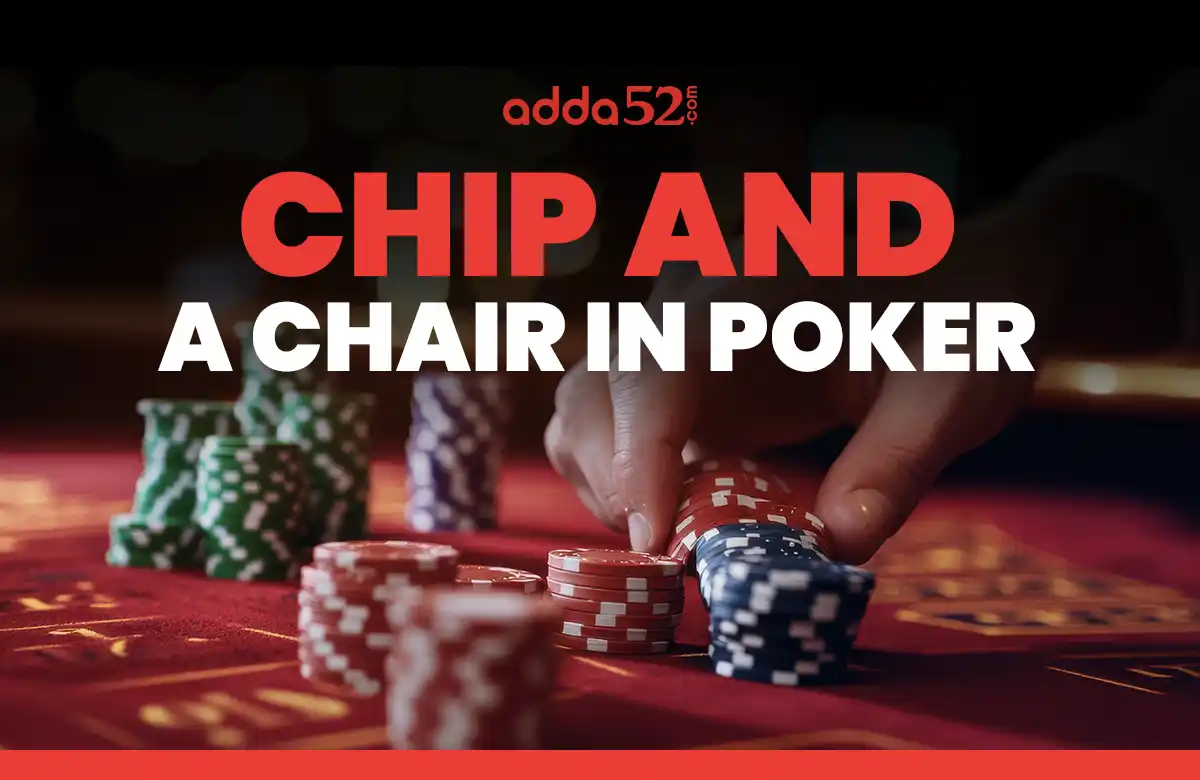
Introduction
“All I need is a chip and a chair!”
This is one of the most famous phrases in the game, and its meaning goes far beyond just a catchy line. It is both a source of hope and a reminder of the game's unpredictable nature.
Here’s everything you need to know about this invaluable Poker lesson.
What is the meaning of a Chip and a Chair?
Poker, particularly tournament play, can be highly volatile. A series of losses can reduce your chip stack to near zero. But, a single hand or a series of favourable situations can quickly change your fortunes. The statement is rooted in the idea that if you have chips and a seat at the table, you are still in the game and have a shot at success. That means, no matter how much you have lost or how far behind you may be, the game isn’t over until it’s over.
The Origins of the Phrase
The expression ‘chip and chair’ or ‘chip in a chair’ originates from a legendary event in Poker history. In the 1982 World Series of Poker (WSOP) Main Event, player Jack ‘Treetop’ Straus lost nearly all his chips. He was left with only one $500 chip. But instead of walking away from the table, Straus decided to stick it out. He wasn’t ready to call it quits.
Determined and focused, he went on a remarkable run, slowly but surely building his stack back up. With a belief that it wasn’t over yet, Straus fought his way through the tournament and eventually made it to the final table. By the end of the tournament, he had gone from having just one chip to being the chip leader. He went on to win the event and claimed his second World Series of Poker (WSOP) bracelet.
Straus’ story became the foundation for the saying ‘chip and chair’. It perfectly conveys that there's always a chance to win if you still hold a chip and sit in your seat.
The Reality of a Comeback in Poker
While Straus’ win was incredible, this kind of comeback is rare. The odds of winning a tournament with only one chip left are quite low, but the phrase ‘chip and chair’ isn’t just about the likelihood of success. It’s about the mindset.
Most players down to a single chip won’t find themselves in Straus’ shoes. When your stack is that small, you are often at the mercy of variance. Even if you double up a few times, you are still incredibly short-stacked compared to the rest of the field. For most, it’s a situation that often leads to elimination. But just because a full recovery from a single chip is rare doesn’t mean the phrase lacks meaning. The truth is that Poker is a game of ups and downs, and anything can happen in a few hands.
What It Means for Short-Stacked Players
The phrase also serves as a reminder to those with a short stack. It highlights that no matter how few chips you have left, you should never stop looking for opportunities to grow your stack. And while you are never really ‘safe’ when you are short on chips, there are strategies you can employ to stay in the game longer.
Adjusting your strategy is crucial when you find yourself with a low chip count. Here are a few things to keep in mind:
- Conservative Play – You need to pick your spots carefully. When your stack is small, each decision becomes even more important. While it’s easy to feel desperate, you must resist the urge to play hands that aren’t worth the risk. Focus on strong hands that give you the best chance of survival, and don’t be afraid to fold weaker hands. Remember, the goal is to get back into the tournament, not to go out with a wild attempt.
- Less Limping – Limping (calling the minimum raise without raising) might seem harmless, but it can quickly chip away at your stack. Instead, be selective about the hands you choose to play. When you’re short-stacked, every chip counts. Be prepared to go all-in when the situation calls for it.
- Avoid Blind Stealing – While stealing blinds is a common tactic, it can be dangerous when you are low on chips. Blind stealing requires a certain level of aggression and timing, and with a small stack, this can often backfire, leaving you with even fewer chips. It’s better to wait for stronger hands and avoid risking your stack on a move that could put you out.
- Tighten Your Starting Hand Range – As your chip stack decreases, you should tighten your hand range. You can’t afford to be as loose with your starting hands when your tournament life is on the line. Stick to premium hands and play them aggressively when the time is right.
- Be Ready to Ship It In – With a small stack; sometimes your best option is to go all-in with a solid hand. The risk is high, but it allows you to double up and rebuild your stack. This strategy is about maximizing the value of your remaining chips and hoping for a favourable outcome.
- Don’t Defend Your Blinds – Defending your blinds can be costly when you are down to just a few big blinds. Instead of fighting for your blinds with weak hands, wait for stronger opportunities to make your move.
- Position Matters Less – When your stack is short, you can’t afford to be picky about your position. What matters most is finding a good hand and being ready to push all in when it’s time. The stakes are higher when you’re low on chips, so make your moves count.
- Stay Focused and Keep Fighting – Remember that it’s not just about the cards you are dealt. Mental toughness and focus are key. Stay patient, wait for your spot, and don’t give up because you are short on chips.
Frequently Asked Questions
What does ‘Chip and a Chair’ mean in Poker?
The phrase means that as long as you have even a single chip left, you still have a chance to make a comeback and win. It originates from the legendary comeback of Jack ‘Treetop’ Straus in the 1982 WSOP, where he won the Main Event despite being down to just one chip at one point.
What’s the best strategy when you are down to one chip?
With one chip left, your only viable move is to wait for a strong hand and go all in. Since you have no fold equity, survival depends on doubling up multiple times. The ideal approach is to push with premium hands like pocket pairs or high Broadway cards.
Can ‘Chip and a Chair’ apply to cash games?
Not really. If you lose all your chips in cash games, you can rebuy. The phrase is most relevant in tournaments, where running out of chips means elimination. However, in some cash game formats like winner-takes-all or survival-based challenges, having even a single chip left could still keep you in the game.
Conclusion
While the phrase has its roots in a specific moment in Poker history, its impact goes far beyond that. It’s a symbol of hope and perseverance. Whether down to your last chip or facing a tough tournament, Poker isn’t over until it’s over. If you have a chip and a chair, you can make your mark and come out on top.
